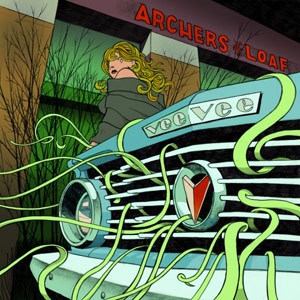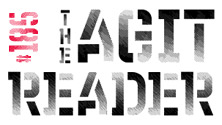
Vee Vee
Merge
Archers of Loaf never actually broke up, they just got tired of the rigmarole world of touring then writing then touring then writing. With confessional, personally important lyrics and high-energy music, churning out song after song can become taxing when there’s no inspiration to spark creativity. So, not having an endless supply of heartbreak and backstabbing lovers to write about is probably not a truly bad problem. It just meant that at a certain point the kindling would turn to ash. Better to burn out, as they say. But it has been long enough for the band to think about the validity of reissues, and the next record in line, after last year’s Icky Mettle deluxe edition, is Vee Vee.
As the more difficult second album, Vee Vee has a grown-up feel, less party vibe and more introspective, capital “S” songwriting. This is largely due to the lead-off track, “Step Into the Light,” and the solid two and a half minutes of slow-burn instrumental intro before Eric Bachmann’s vocals even start. Songs like “Greatest of All Time” follow this tact, more build, less quiet-loud quiet-loud and much more narrative lyricism. In keeping with his role as the poet laureate of indie-rock, like the first album’s “Plumb Line,” Bachmann points the lyrical knives back at his side of the stage instead of out to the poseurs joining the crowd late. This time it’s a comparison of the two sides of fame: either you get attention because you suck so bad they want you to die or you die and they gather to toast to how great you were until the “underground is over-crowded” with sycophantic fans or solipsistic rock heroes. Vee Vee contains some of the Archers’ more popular, “breakthrough” songs that took them off the college rock map and put them in the ears of the bustling alternative scene. It was an important record then, and it remains that way. Maybe they’ll walk one of these songs out on Jimmy Fallon like they did after the last reissue and you can see for yourself.
I thought of making a joke about how this is just a money grab ploy by the punks at Merge Records, but the truth is almost weirder than a silly joke. They actually wanted to offer fans a chance to buy the music on vinyl, giving a new generation of indie-rockers a chance to get acquainted with one of the best records of the ’90s, and the band a chance to beef up the product in a way they couldn’t before. Honestly, I couldn’t find the damn record in stores when it came out; I had to settle for the compact disc. The same goes for the “Harnessed in the Slums” and “Smoking Pot in the City” singles, both included here with a smattering of four-track demos and something they’re calling the “Marathon Boombox” demos (these are actually Bachmann and a plinky guitar playing to an open window above a restaurant called the Marathon). Bob Weston took the job to remaster Vee Vee, which isn’t one of those “hand it over to a big name” tricks. He actually engineered the first go around, so he gets a second chance to tweak it. Some of the guitars that were once inaudible are brought up in the mix; the ghost voices in “Step Into the Light” are a little more prominent than before. The ultra-roomy, typical indie rock drums have more presence and feel much less than a hundred yards away. To give it an even more updated look, they even roto-scoped the iconic mysterious hot blonde on a classic car cover photo and gave it a little more computer generated nature. I speculate this was perhaps a wink towards remastering it digitally . They probably just couldn’t find the original proofs for the artwork, so they decided to update it and make it even cooler than it was. If you find it a superfluous, self-congratulatory exercise in back-pattery on the part of the Archers boys, realize please that you actually do need this record in your collection and they’ve given you a chance to get a nicer copy.
Michael P. O’Shaughnessy
PAST PERFECTS
Giant Single: The Profile Records Rap Anthology
Karen Dalton, 1966
Mighty Sparrow, Sparrowmania! Wit, Wisdom and Soul from the King of Calypso 1962-1974
Gaunt, I Can See Your Mom from Here
Alex Chilton, Free Again: The "1970" Sessions
The Lucy Show, Remembrances
Boddie Recording Company: Cleveland, Ohio
Smashing Pumpkins, Gish and Siamese Dream
U2, Achtung Baby
Can, Tago Mago
Leonard Cohen, The Complete Albums Collection
The Smiths, Complete
Void, Sessions 1981-83
Fac. Dance: Factory Records 12" Mixes & Rarities 1980-1987
